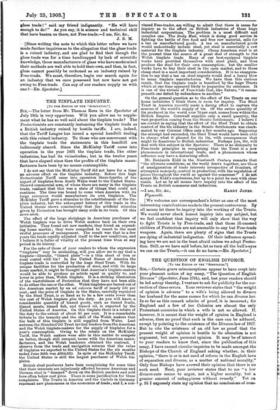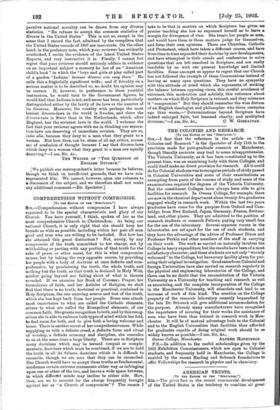THE QUESTION OF ENGLISH DIVORCE.
f TO THE EDITOR OF THE "STIOTATOR.1 Sis,—Certain grave misconceptions appear to have crept into your pleasant notice of my essay, " The Question of English Divorce" (Spectator, June 27th), and, lest your readers should be led astray thereby, I venture to ask for publicity for the cor- rection of these errors. Your reviewer states that " the weight of opinion is adverse " to a wife's being allowed to divorce her husband for the same causes for which he can divorce her. In so far as this remark admits of proof, it is incorrect; for England and a few of her Colonies are almost the only Protestant countries in which a wife is not so allowed. rf, however, it is meant that the weight of opinion in England is adverse, then no proof that such is the case can be adduced, except by pointing to the existence of the Divorce-law of 1857. But to cite the existence of an old law as proof that the present weight of opinion is hostile to its alteration is not argument, but mere perional opinion. It may be of interest to your readers to know that, since the publication of this essay, I have caused circular inquiries to be made amongst the Bishops of the Church of England asking whether, in their opinion, "there is or is not need of reform in the English laws of separation and divorce, as a matter of national morality." Only four Bishops have avowed their opinion that there is no such need. Next, your reviewer states that to me " a low divorce-rate seems to argue, not a higher morality, "but a greater amount of unhappiness without remedy." Yet on p. 95 I expressly state my opinion that no conclusions of com. "parative national morality can be drawn from any divorce statistics. " He refuses to accept the common statistics of divorce in the United States." This is not so, except in the sense that I record the fact, admitted by the compilers, that the United States records of 1867 are inaccurate. On the other hand, in the prefatory note, which your reviewer has evidently overlooked, I recite the evidence of the latest United States Reports, and very instructive it is. Finally, I cannot but regret that your• reviewer should seriously adduce in evidence on an important subject a memory he has of an " American child's book " in which the " boys and girls at play called part of a garden 'Indiana' because divorce was easy there." He calls this a frightfully significant trifle ; and if frivolity on a serious matter is to be described so, no doubt his opinion may be correct If, however, in preference to these youthful instructors, he would turn to the Government figures, he would find that Indiana is not, and never has been, particularly distinguished either by the laxity of its laws or the number of its divorces. Moreover, the country with perhaps the most lenient divorce-laws in the world is Sweden, and there the divorce-rate is ltwer than in the Netherlands, which, after England, has the strictest laws in the world. I welcome the fact that your reviewer agrees with me in thinking our separa- tion-laws are deserving of immediate revision. They are so, infer alia, because they deny to a man what they grant to a woman. But how, then, can he, alone of all my critics, accuse me of confusion of thought because I say that divorce-laws which deny to a woman what they grant to a man are equally deserving 9-1 am, Sir, &c.,
THE WRITER OF "THE QUESTION OF ENGLISH DIVORCE."
[We publish our correspondent's letter because he believes, though we think on insufficient grounds, that we have mis- represented him. We cannot, however, open our columns to a discussion of the subject, and we therefore shall not make any additional comment.—ED. Spectator.]







































 Previous page
Previous page